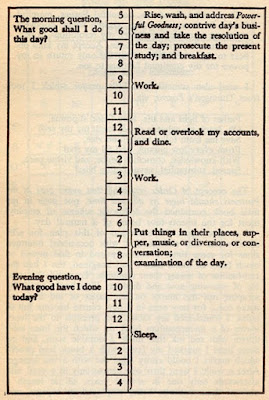New year, a fresh start. Thankful for friends and family. Throughout 2019 I tried an approach that helped my daily routine immensely and I want to share it. What I did was simple. IF NOTHING PREVENTS ME Instead of writing "to do" somewhere in my dailies and closing it in a box, I wrote "If Nothing Prevents Me" and left the space open. Instantly I had more flexibility and less stress. By not closing the box did not force me to fill it. And if something did not get done, oh well. I mark it as "IP" (in progress) and move on. At some point later in the day I went back and filled in the space around the list with a journal entry or artwork. COUNTING THE HOURS Inspired by Benjamin Franklin, I occasionally number the hours down one side of the page: 5,6,7,8,9,10,11,12,1,2,3,4,5,6,7,8,9,10,11,12. At each hour, I wrote in what happened, such as "Wake and day-prep," and "commute" and "Meeting" and "Gym" and even &quo



